We’re happy to announce the release of Docker Desktop 4.26, which delivers the latest breakthroughs in Rosetta for Docker Desktop optimization, transforming the Docker experience for all users. The new release also boosts developer productivity by solving common issues such as Node.js freezes and PHP segmentation faults and supercharges performance with speed enhancements and a new view into your Docker Desktop builds.
Read on to learn how Rosetta slashes Linux kernel build times, accelerates PHP projects, and optimizes image building on Apple silicon. Additionally, we are introducing PHP support in Docker Init and enabling administrators to manage access to Docker Desktop Beta and Experimental Features.
Upgrade to Docker Desktop 4.26 and explore these updates, which enable smoother development experiences and seamless containerization for diverse tech stacks.
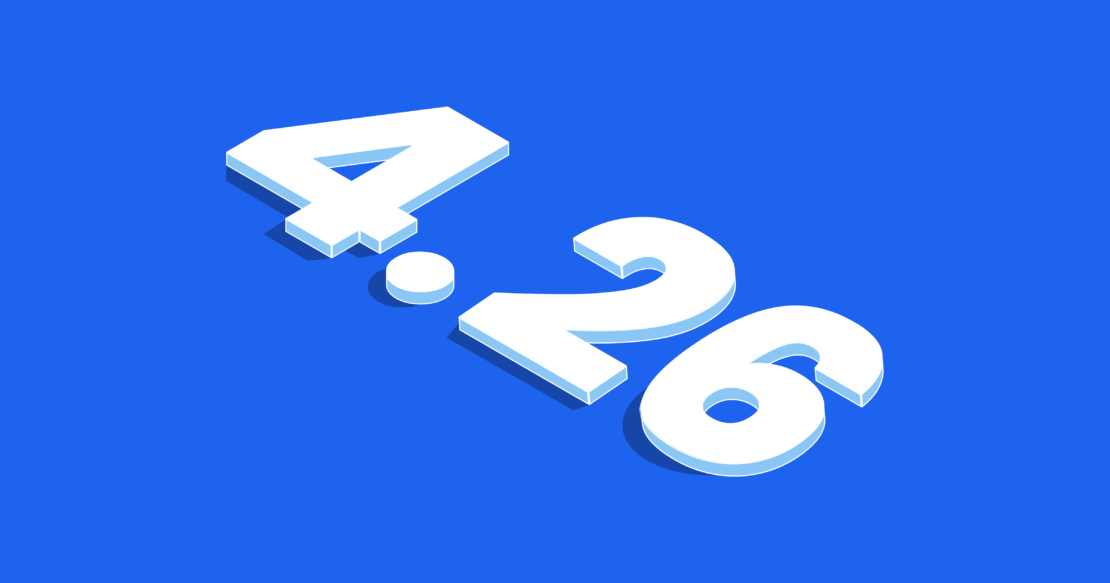
Rosetta for Docker Desktop
Docker Desktop 4.26 ensures a smoother Rosetta for Docker Desktop experience:
- Node.js freezing for extended periods? Fixed.
- PHP encountering segmentation faults? Resolved.
- Programs dependent on chroot? Also addressed.
- Rosetta hangs on Sonoma 14.0? No more.
Moreover, our team has been hard at work improving Rosetta’s performance in specific scenarios. Consider, for example, building projects like PostHog for both AMD64 and Arm64. Previously clocking in at 17 minutes, it’s now achieved in less than 6 minutes.
You will now be able to experience the power of Rosetta for Docker Desktop as it reduces Linux kernel build time from 39 minutes to 17 minutes with just 10 CPUs and QEMU.
PHP and Composer users will discover that building Sylius Standard from scratch now takes only 6 minutes (down from 20) with Docker Desktop’s default configuration on Rosetta.
While building AMD64 images on Apple silicon with Rosetta is faster than ever, native Arm64 images remain the speediest option. Docker Hub hosts a variety of Arm64 images for your preferred language, ensuring fast performance for your projects.
Introducing PHP support in Docker Init
We want to ensure that we continue making Docker easier for all of our users and all languages. Based on user insights, we’ve launched Docker Init (Beta) — simplifying containerization for various tech stacks. (Read “Docker Init: Initialize Dockerfiles and Compose files with a single CLI command” to learn more.)
Docker Init automatically generates Dockerfiles, Compose YAML, and `.dockerignore` files by detecting your application’s language and runtime specifics. Initially supporting Golang, Python, Node, Rust, and ASP.NET Core, Docker Init offers PHP web application support in Docker Desktop 4.26 (Figure 1).
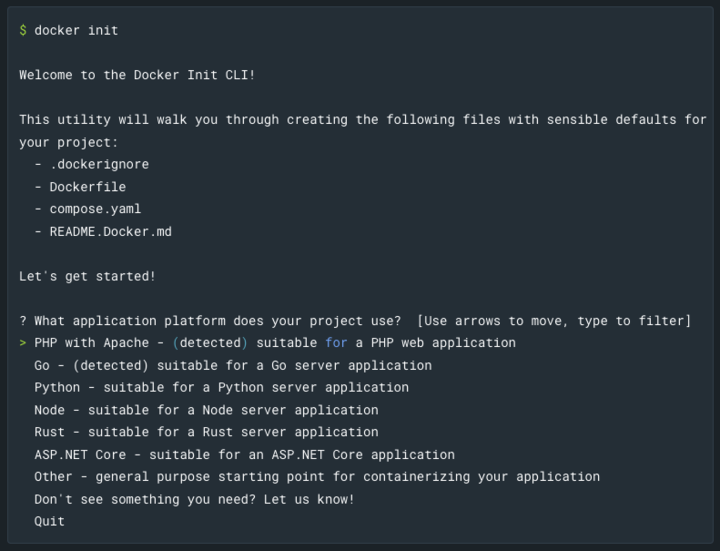
Users can now create Dockerfiles for PHP projects, covering Apache-based web applications using Composer for managing dependencies.
Get started by ensuring you have the latest Docker Desktop version. Then, execute docker init in your project directory through the command line. Let Docker Init handle the heavy lifting, allowing you to concentrate on your core task — building outstanding applications.
Introducing Docker Desktop’s Builds view GA
For engineers focused on innovation, build issues can be a major roadblock. That’s why we’re happy to announce the general availability of the Builds view, offering detailed insights into build performance. Get live updates on your builds, analyze past performance, and troubleshoot errors and cache issues.
The Builds view simplifies troubleshooting by retaining past build data, ensuring you can diagnose failures long after losing terminal logs. Easily explore runtime context, including arguments and the complete Dockerfile. Access the full build log directly from the UI, eliminating the need to re-run builds for a detailed overview (Figure 2).
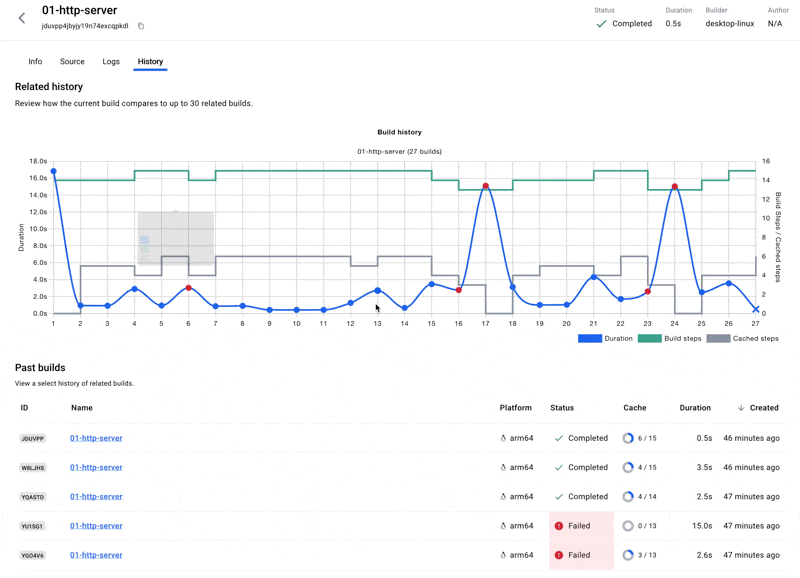
Read the announcement blog post to learn more about the Builds view GA release.
Admin update: Managing access to Docker Beta and Experimental Features
At Docker, we continuously experiment and deliver the latest features directly into the hands of our users and customers. We’re dedicated to empowering Docker administrators by offering increased control over how these innovations are introduced within their development organizations. Through the flexibility of the admin-settings.json, administrators can now fine-tune feature accessibility (Figure 3).
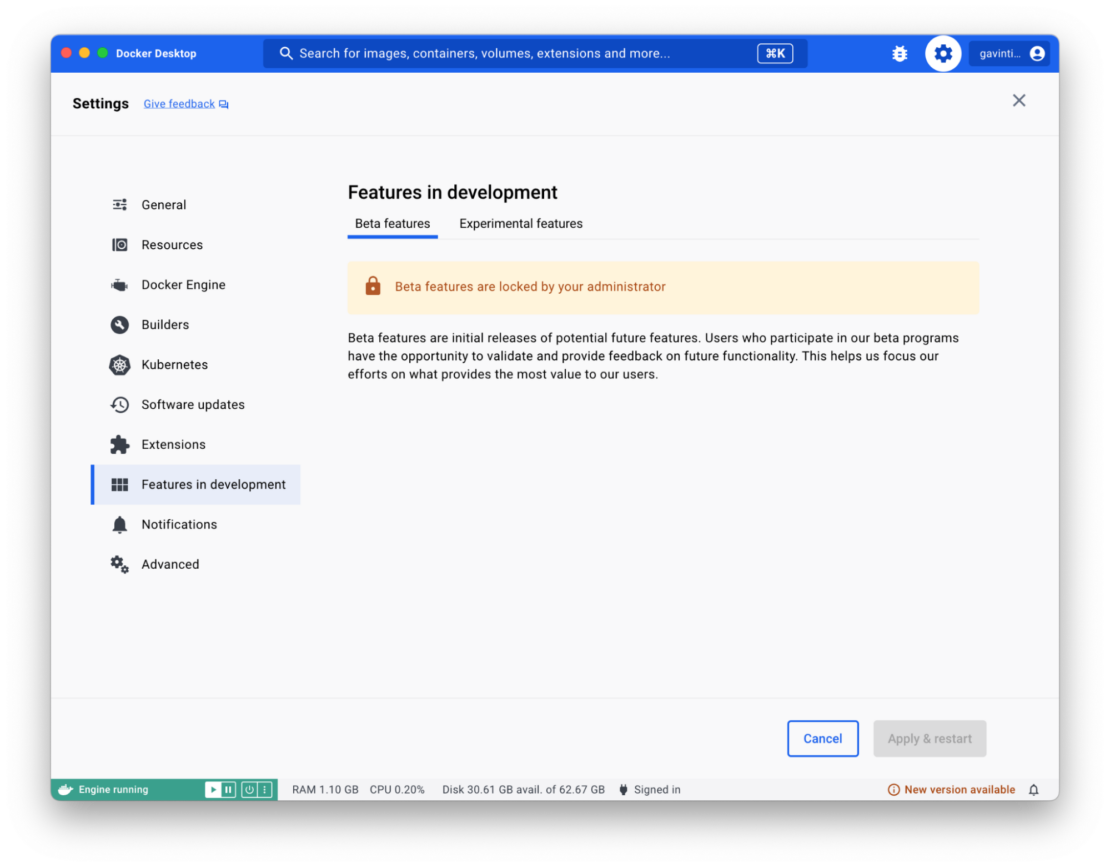
This update enables precise customization, allowing admins to align Docker’s Beta and Experimental Features with their organization’s specific requirements. Whether restricting access to individual tabs or implementing comprehensive controls across the board, this enhancement caters to diverse development practices, providing the flexibility needed to optimize the Docker experience for every user (Figure 4).
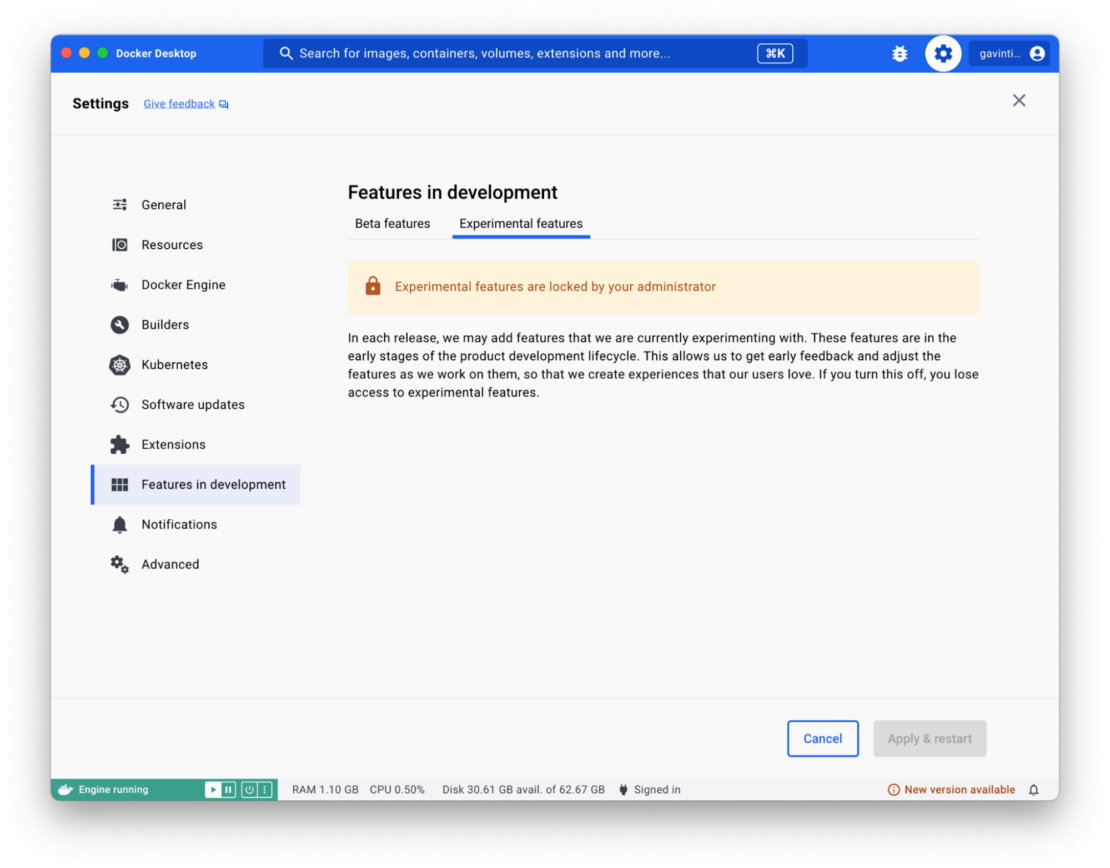
Refer to the documentation for more on configuration settings management.
Develop in the cloud with Docker Desktop and Microsoft Dev Box
In addition to running Docker Desktop from the comfort of your personal computer, you can now leverage this familiar experience within the cloud with Microsoft Dev Box. In a Microsoft Ignite session and a recent blog post, developers got their first glimpse of how easy it can be to create containers in the cloud with Docker Desktop and Microsoft Dev Box.
We invite you to navigate to the Azure Marketplace to download the public preview of the Docker Desktop-Dev Box compatible image and start developing in the cloud with a native experience. Additionally, this image can be activated with your current subscription, or you can buy a Docker Business subscription directly on Azure Marketplace.
Conclusion
Stay tuned for more groundbreaking developments and optimizations to streamline your Docker experience. Your feedback fuels our progress, and we’re committed to delivering solutions that simplify development and empower every user.
Upgrade to Docker Desktop 4.26 to explore these updates and experiment with Docker’s latest features.
Learn more
- Read the Docker Desktop Release Notes.
- Install the latest release of Docker Desktop.
- Learn about Docker Desktop Now in Microsoft Dev Box.
- Read Docker Init: Initialize Dockerfiles and Compose files with a single CLI command.
- Have questions? The Docker community is here to help.
- New to Docker? Get started.
